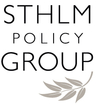Study on international justice sector support Oct 15
Sthlm Policy Group · Comments: 0Stockholm Policy Group was commissioned by Sida, in the spring of 2014, to map and assess Swedish contributions to the strengthening of the justice sector in partner countries between 2010 and 2013, as well as the support provided to strengthen partner states’ capacity and political will to address international crimes, i.e. ‘complementarity’ support, in the same period.
The study provides an overview of Sida’s justice sector work over time, the geographic allocation of resources, the thematic focus of Sida’s support, as well as the implementing actors. It classifies justice sector support by the following seven broader categories: i) Justice & conflict / state fragility; ii) Access to Justice; iii) Prosecutors, police and penal management; iv) Efficiency of courts and justice systems; v) Traditional justice systems; vi) Gender justice; and vii) Juvenile justice.
A central reference point for the study has been the Change for Freedom - Policy for Democratic Development and Human Rights in Swedish Development Cooperation, 2010-2014. The study seeks to understand the coherence between the aim and objectives of the policy and its operationalization in Swedish development cooperation - in strategies, programs and policy dialogue. The scope of the study is limited to one of the three focus areas of the policy, i.e. the institutions and procedures of democracy and the rule of law. The policy outlines the critical importance for Sweden to support partners to build their own proper functioning institutions and procedures and ”gain credibility and legitimacy in the eyes of those living in poverty”. The study exclusively focuses on Sida’s work with justice sector institutions and actors, and support to civil society groups directly involved in formal or informal justice processes and adjudication, including traditional justice systems. It does not include, however, general work to enhance the awareness of human rights among rights holders or broader human rights capacity building and advocacy.
Following the adoption of the policy Change for Freedom in 2010 there are relatively few strategies with an explicit and specific focus on the justice sector support. However, most of them acknowledge the importance of rule of law and a functioning judicial system, and point to the fact that Swedish support should contribute to reform processes that strengthen these pillars in partner countries. They often fall short, however, of elaborating on a more strategic level, how the justice sector should be addressed through programs or dialogue. Nevertheless, this study highlights a few examples of country strategies and portfolios where there has been a clear focus on the justice sector. It will be important to draw lessons from these examples in formulating new results strategies and shaping country portfolios.
The Aid Policy Framework and the entry values for a number of results strategies in 2014 emphasize rule of law and ensuring the legal rights and security of individuals, working through all parts of the justice chain. On an overall level, taking into account policy frameworks, strategies, country portfolios, as well as the total size of justice sector support, the study was not able to conclude that there is an increasing level of ambition in Swedish justice sector support. Given the limited size of Sida’s current justice sector portfolio in relation to the total allocations within democracy and human rights, there is significant room to identify and devise a more comprehensive approach to justice sector support; through strategies, programs and policy dialogue.
In relation to ‘complementarity’ support the study noted that there is no commonly agreed definition of what this type of support is and that Sida does not specifically classify contributions or initiatives as complementarily work. Nevertheless, the study confirmed that a number of programs and projects had been supported in the relevant period, which had a direct or indirect effect on the partner states’ capacity to investigate and prosecute international crimes. It was further noted that there is a need for further development of policy and methodology for complementarity support – both at the international and national level.
Comments: 0